The John Lewis Good Trouble Questionnaire
Nichelle Hicks, Baltimore County High School Special Educator
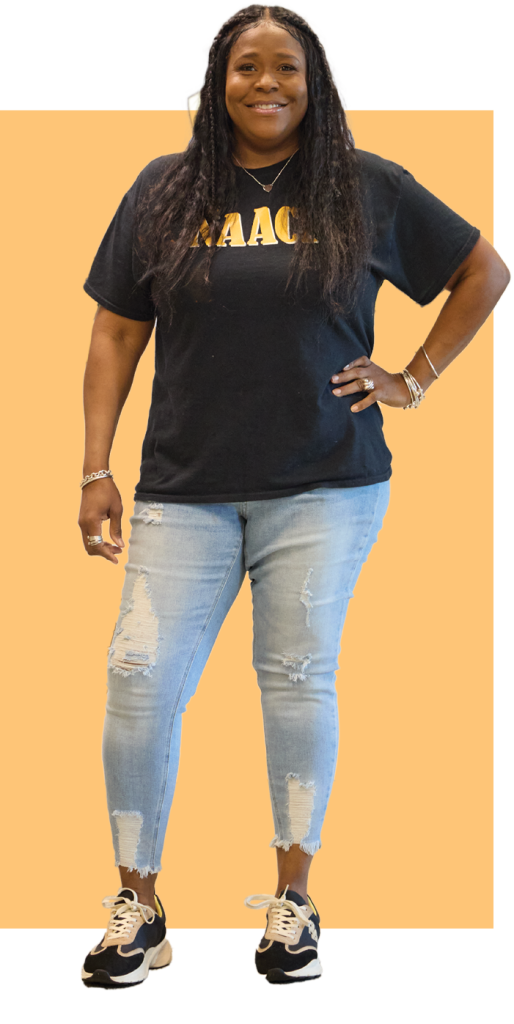
Nichelle Hicks is an educator, activist, and advocate with over 30 years of experience in urban education. A passionate advocate for creating equitable and inclusive spaces, she works to empower Black and Brown youth, particularly those impacted by exclusionary discipline and systemic inequities in education. In 2023, with 25 students and Nichelle as its founding members, Parkville High School established the first high school-based NAACP chapter in Baltimore County. Nichelle’s mission is to start a chapter in every high school in the county and in fact, New Town High School is currently chartering a sister chapter. Nichelle is also active in supporting voting rights awareness and voter registration at her school.
What issues agitate you most about public schools? Racial disparities in discipline and the lack of resources that limit students’ potential, especially in urban schools. I’m especially passionate about supporting Black boys impacted by exclusionary discipline, because their brilliance deserves to shine. I wish more teachers would exhibit empathy rather than sympathy for our students.
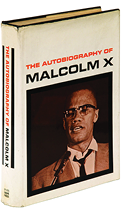
When did you first realize you had power and that your voice truly matters? I was that student—counted out, suspended, and overlooked. I knew what it felt like to be unseen. Everything changed in college when I read The Autobiography of Malcolm X. His journey lit a fire in me and made it clear—I was called to be an educator. Not just to teach, but to reach students like me. From that moment on, I understood that my lived experience is my strength, and when I lead with truth and love, my voice becomes a force for change.
When you work so hard for your cause, self care is important. How do you take care of yourself? I protect my peace by setting boundaries and honoring rest. Time with my sons brings me joy and reminds me of my purpose.
What is your favorite activist t-shirt? Parkville High School NAACP “Our Voice Matters.”
Who is your activist hero? Fannie Lou Hamer. Her courage, resilience, and deep commitment to justice inspire me. She reminds me that activism isn’t always loud, but it’s always powerful. Like her, I believe in grassroots change and using my voice and story to challenge and rebuild unjust systems with justice, equity, and love. She reminds me that activism isn’t always loud, but it’s always powerful—and that’s the kind of impact I strive for every day.
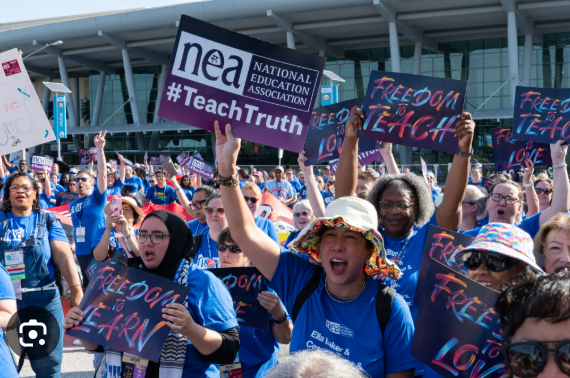
What’s the most exciting march or protest you attended? It was during the annual NEA Convention in 2023 in Florida when educators rallied against Gov. DeSantis’ “woke-agenda” ban. We stood in solidarity with our Florida colleagues, fighting for the right to teach and learn about diverse histories and identities.
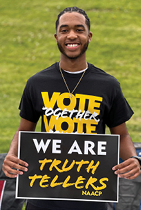
What campaign or issue is at the top of your radar? I’m focused on empowering students, particularly my high school NAACP members, to use their voices to advocate for change. We can cultivate a generation of leaders committed to justice and equity in education.
Who listens to you rant about the issues you care about the most? I often rant to my circle of seasoned educators who understand the struggles we face in the classroom and the systemic issues impacting our students. Their experience and wisdom make those rants feel like meaningful conversations, and together we brainstorm ways to make a real impact.
What keeps you doing this work when it’s hard? I think about the kids who feel unseen, who are pushed aside or labeled, and it fuels me to keep going. I remember my own struggles, how hard it was to find a space where I felt heard and valued, and I’m determined to be that space for others.
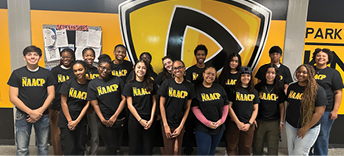
What’s your favorite way to make good trouble? Speaking up and advocating for students, especially those who feel unheard, like my high school NAACP members. I push them to use their voices and take action on the issues that matter most to them, whether it’s challenging policies that impact Black and Brown students or advocating for more inclusive education.I make trouble by not staying silent, by encouraging my students to do the same, and by disrupting systems that fail to serve them.
What do you wish more members knew about getting involved in their local or MSEA? What I wish more members knew about getting involved in their local or MSEA is that your voice truly matters—and your presence can shift the culture. So many of us think we have to wait until we have a certain title or level of experience to speak up or lead, but the truth is, the union is ours. It only gets stronger when we show up.
What one thing do you wish elected leaders and the public understood about your job? When we fail to address the systemic inequities in education, it’s not just students who suffer, it’s the entire community. My work is rooted in love for my students and the belief that education is the key to liberation and transformation.

